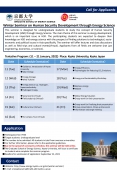Seminar/Hội thảo
Hội thảo trực tuyến “Textile Engineering Weaves the World” - KIT Fiber and Textile Science Seminar - Winter 2021 Online
10:50, 04/11/2021
0
- Đơn vị tổ chức: Kyoto Institute of Technology, Nhật Bản
- Thời gian: 20 & 21 tháng 12 năm 2021
- Thời gian: 20 & 21 tháng 12 năm 2021
Webinar Kiểm tra chất lượng thực phẩm
13:39, 17/10/2021
0
Sự phát triển của công nghiệp thực phẩm ngày nay dẫn đến nhiều vấn đề đáng quan tâm về chất lượng và sự an toàn của thực phẩm. Do vậy, việc xây dựng quy trình sản xuất thực phẩm đạt chất lượng như công bố và kiểm soát được chất lượng thực phẩm là nhu cầu thiết yếu.
IMAGINE THE FUTURE FAIR 2021
19:59, 14/10/2021
0
Trường Đại học Tsukuba, Nhật Bản tổ chức 2 webinar giới thiệu về các chương trình hệ ĐH và sau ĐH dành riêng cho SV nước ngoài, thực hiện trên nền tảng AIRMEET.
Webinar Ứng dụng học máy trong phân tích dữ liệu y sinh
14:15, 11/10/2021
0
Sự phát triển của Y học và Công nghệ sinh học đã tạo ra lượng rất lớn dữ liệu. Việc phân tích nguồn dữ liệu to lớn này không những có ý nghĩa trong nghiên cứu mà còn có tiềm năng ứng dụng trong chẩn đoán các bệnh. Nhờ sự phát triển của công nghệ thông tin, trí tuệ nhân tạo và học máy đã dần được ứng dụng trong phân tích các dữ liệu y sinh học.
Webinar Vaccine và công nghệ sản xuất vaccine
16:52, 03/10/2021
0
Vaccine đã và đang là một trong những giải pháp hiệu quả nhất bảo vệ con người khỏi các bệnh truyền nhiễm. Với mục tiêu chia sẻ những thông tin về bản chất, cơ chế, công nghệ được ứng dụng và quy trình sản xuất các loại vaccine hiện nay, webinar "Vaccine và công nghệ sản xuất vaccine" được tổ chức trong khuôn khổ môn học "Những vấn đề hiện đại trong lĩnh vực CNSH" do TS. Nguyễn Trí Nhân phụ trách.
Webinar Ý nghĩa của Nông nghiệp hữu cơ đối với đời sống hiện đại
19:56, 27/09/2021
0
Để thực hiện 17 mục tiêu phát triển bền vững của Liên hiệp quốc, nền nông nghiệp nói chung của thế giới, không riêng Việt Nam, bắt buộc cần thay đổi phương thức canh tác hiện nay. Để có giải pháp cho vấn đề khó khăn này, nông nghiệp hữu cơ đang dần chứng minh là một trong những công thức hiệu quả giúp giải bài toán nông nghiệp bền vững cho toàn cầu (Eyhorn et al, 2019).
Webinar Ứng dụng Công nghệ Vi sinh trong Xử lý và Tái chế Bùn thải
21:28, 20/09/2021
0
Với mục tiêu góp phần xây dựng nền kinh tế tăng trưởng bền vững hay nền kinh tế tuần hoàn, việc nghiên cứu xử lý và biến đổi các chất thải hay phụ phế phẩm của các ngành sản xuất để vừa giúp giảm thải ra môi trường, vừa tạo ra các sản phẩm có giá trị sử dụng, hiện đang được nhiều quốc gia quan tâm nghiên cứu và phát triển, trong đó có Việt Nam.Với mục tiêu góp phần xây dựng nền kinh tế tăng trưởng bền vững hay nền kinh tế tuần hoàn, việc nghiên cứu xử lý và biến đổi các chất thải hay phụ phế phẩm của các ngành sản xuất để vừa giúp giảm thải ra môi trường, vừa tạo ra các sản phẩm có giá trị sử dụng, hiện đang được nhiều quốc gia quan tâm nghiên cứu và phát triển, trong đó có Việt Nam.Với mục tiêu góp phần xây dựng nền kinh tế tăng trưởng bền vững hay nền kinh tế tuần hoàn, việc nghiên cứu xử lý và biến đổi các chất thải hay phụ phế phẩm của các ngành sản xuất để vừa giúp giảm thải ra môi trường, vừa tạo ra các sản phẩm có giá trị sử dụng, hiện đang được nhiều quốc gia quan tâm nghiên cứu và phát triển, trong đó có Việt Nam.Với mục tiêu góp phần xây dựng nền kinh tế tăng trưởng bền vững hay nền kinh tế tuần hoàn, việc nghiên cứu xử lý và biến đổi các chất thải hay phụ phế phẩm của các ngành sản xuất để vừa giúp giảm thải ra môi trường, vừa tạo ra các sản phẩm có giá trị sử dụng, hiện đang được nhiều quốc gia quan tâm nghiên cứu và phát triển, trong đó có Việt Nam.
Webinar Building the sustainable material for the future
14:12, 13/09/2021
0
The last 5 years have seen a pronounced increase in excitement around “biomaterials” for the fashion industry. As brands consider their environmental and social impacts, along with rising ethical concerns from consumers, the search for more ‘sustainable’ alternatives is driving innovation. Wider trends are further contributing to interest in biomaterials; from climate change and the potential for lower carbon footprints vs fossil-based synthetic materials, the war on plastics, to the rapid growth of veganism and a rush to find alternatives to animal-derived materials. The webinar "Building the sustainable material for the future" aims to bring you knowledge about biomaterials for the fashion industry. The webinar is organized in framework of the course "Current topics in Biotechnology.
Webinar Sản phẩm và công nghệ sinh học trong lĩnh vực thẩm mỹ
19:37, 05/09/2021
0
Nhằm chia sẻ thông tin về những nhu cầu thực tiễn và sản phẩm hiện có trong lĩnh vực chăm sóc sắc đẹp, cũng như các nghiên cứu phát triển sản phẩm mới ứng dụng kỹ nghệ mô và công nghệ tế bào gốc ở Trường Đại học Khoa học Tự nhiên, ĐHQG-HCM, webinar "Sản phẩm và công nghệ sinh học trong lĩnh vực thẩm mỹ" được tổ chức trong khuôn khổ môn học "Những vấn đề hiện đại trong lĩnh vực Công nghệ Sinh học:
Hội nghị Quốc tế trường Đại học Tsukuba, Nhật Bản
20:38, 31/08/2021
0
1. Tsukuba Global Science Week (TGSW) 2021
Thời gian: 06/09 - 11/09
Đăng ký: https://tgsw.
2. Tsukuba Conference 2021
Thời gian: 21/09 - 30/09
Đăng ký: https://tsukuba-
Thời gian: 06/09 - 11/09
Đăng ký: https://tgsw.
2. Tsukuba Conference 2021
Thời gian: 21/09 - 30/09
Đăng ký: https://tsukuba-
Webinar về các phương pháp xét nghiệm - chẩn đoán Covid-19
09:44, 31/08/2021
0
Nhằm giúp các bạn sinh viên có cái nhìn tổng quát về xét nghiệm nói chung và xét nghiệm chẩn đoán COVID-19 nói riêng, những khác biệt giữa nghiên cứu và xét nghiệm cũng như hiểu được những vấn đề phía sau một kết quả xét nghiệm, Webinar "Những phương pháp xét nghiệm chẩn đoán COVID-19" trong khuôn khổ môn học "Những vấn đề hiện đại trong lĩnh vực Công nghệ Sinh học" được tổ chức:
Thư mời viết bài tham luận Hội thảo khoa học trẻ "Nghiên cứu khoa học và hiểu về VACXIN COVID - 19
11:40, 30/08/2021
0
Trung tâm Phát triển Khoa học và Công nghệ Trẻ phối hợp với Câu lạc bộ các nhà khoa học trẻ TP.HCM tổ chức Hội thảo khoa học trẻ "Nghiên cứu khoa học và hiểu về VACXIN COVID - 19", Ban tổ chức Hội thảo kính mời quý thầy/cô, anh/chị và các bạn sinh viên quan tâm tham gia viết bài tham luận
Hội thảo “AUN-KU Winter Seminar on Human Security Development through Energy Science”
14:20, 04/08/2021
0
Hội thảo “AUN-KU Winter Seminar on Human Security Development through Energy Science”, được phối hợp tổ chức bởi Graduate School of Energy Science (GSES), Kyoto University và the ASEAN University Network-Kyoto University Student Mobility Program.
DKSH Technology – Hội Thảo Định Hướng Nghề Nghiệp Cho Sinh Viên
15:32, 29/07/2021
0
Với hơn 1,360 chuyên gia, trong đó có hơn 500 kỹ sư chuyên ngành, DKSH Technology phục vụ cho khách hàng của hơn 25,000 công ty. Chúng tôi hoạt động ở 18 quốc gia với 80 địa điểm kinh doanh, hơn 25 phòng trưng bày và phòng thử nghiệm. Chúng tôi hoạt động như một liên kết tin cậy giữa các nhà cung cấp từ châu Á, châu Âu và châu Mỹ và các khách hàng ở châu Á, cho phép các nhà cung cấp mở rộng thị trường của họ đến các khách hàng trên toàn thế giới.
























